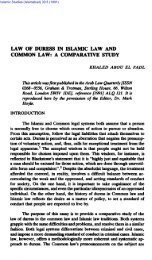ORPHANED GRANDCHILDREN IN ISLAMIC SUCCESSION LAW
ORPHANED GRANDCHILDREN IN ISLAMIC SUCCESSION LAW
ORPHANED GRANDCHILDREN IN ISLAMIC SUCCESSION LAW
Create successful ePaper yourself
Turn your PDF publications into a flip-book with our unique Google optimized e-Paper software.
<strong>ORPHANED</strong> <strong>GRANDCHILDREN</strong> <strong>IN</strong> <strong>ISLAMIC</strong> <strong>SUCCESSION</strong> <strong>LAW</strong> 25'1<br />
in prescribed proportions to the nearest living members of his<br />
family.<br />
The position of legacies deserves closer attention. True, legacies<br />
cannot exceed one-third of the estate left after the satisfaction<br />
of funeral expenses and debts and at least two-thirds must be left<br />
for the family of the deceased. It is also true that although the<br />
legacies rank third in order of priority (i.e. before the heirs) there<br />
is no elment of compulsion with regard to providing for them by<br />
will. But these considerations cannot detract from the higher<br />
religious merit (within the bequeathable one-third) which many<br />
juch bequests possess ; the more so when his family is reasonably<br />
provided for.<br />
Finally. it is worth recalling once more that the basis on which<br />
the fourth category-of heirs-are to be provided for out of the<br />
estate emphasize the family as against the tribal relatives and<br />
within the family, emphasize the immediate agnatic lineal family as<br />
against the collaterals and the more distant kindred.<br />
It is in this context that the system of obligatory<br />
bequests and the system of inheritance by right should be<br />
compared.<br />
II. The System of Oblisatory Bequests<br />
The fullest development of the system of obligatory bequests is<br />
to be found in the Egyptian law of 1946 which applies to predeceased<br />
daughters' children as well as those of predeceased sons.<br />
Briefly the 1946 law provides that the propositus is obliged to<br />
make a bequest in favour of grandchildren by any son or daughter<br />
who has predeceased him (if they would not be entitled to any<br />
share on intestacy) provided that this bequest does not exceed the<br />
limit of one-third for legacies or the equivalent of the share of the<br />
predeceased son or daughter whichever is less. Should the grand-<br />
father fail to make such a bequest the court will act as if he had<br />
and such an implied or obligatory bequest will have priority over<br />
any voluntary bequests which the propositus may have actually<br />
provided for in his will. The main Islamic authority for this<br />
reform is stated to be verse I1 : 180 of the Qur'an which states :<br />
"It is prescribed for you when death approaches one of you, if<br />
he leaves behind wealth the (making of a) bequest for parents<br />
and relatives equitably as a duty for pious."<br />
In the earlier verses of the Fourth Siirah2 fixed shares are allotted
















